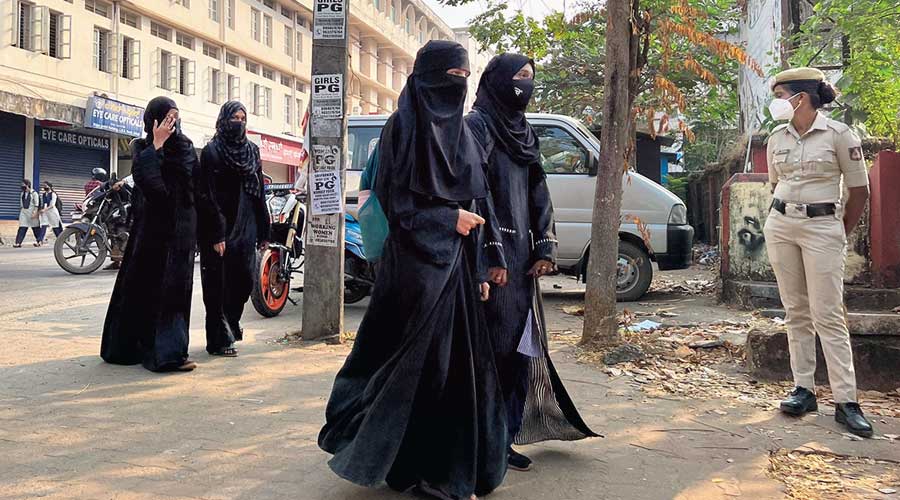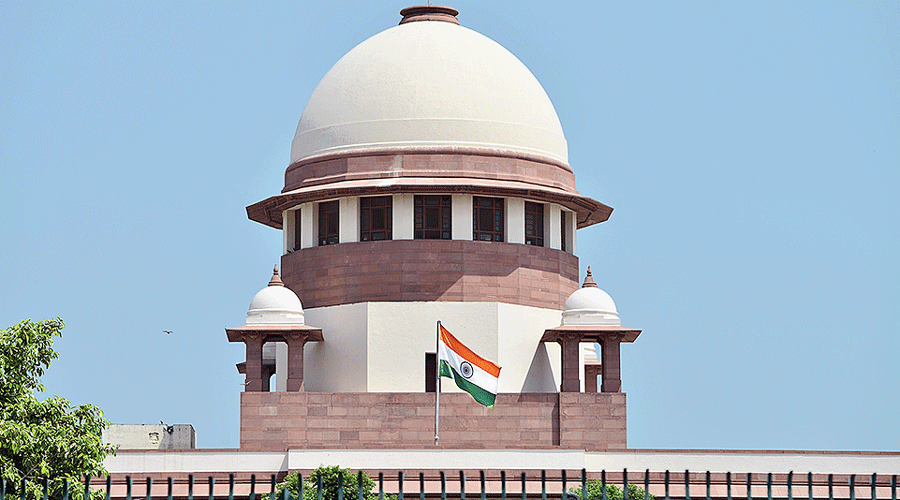The Supreme Court Wednesday said that the question in the Karnataka Hijab ban matter is only about the restriction in schools as nobody is prohibited from wearing it anywhere else they want.
The apex court was hearing arguments on a batch of pleas challenging the Karnataka High Court verdict refusing to lift the ban on hijab in educational institutions of the state.
A bench of Justices Hemant Gupta and Sudhanshu Dhulia was told by senior advocate Devadatt Kamat, who appeared for one of the petitioners, that the matter be referred to a five-judge constitution bench.
He argued that if a girl, in the exercise of her rights under Articles 19, 21, or 25 of the Constitution, decides to wear a Hijab, then can the State put a prohibition that will violate her rights.
The bench orally observed "The question is nobody is prohibiting you from wearing Hijab. You can wear it wherever you want. The only restriction is in the school. We are only concerned with that question."
At the outset, Kamat said his endeavour is to persuade the bench to consider reference of this matter under Article 145 (3) of the Constitution.
Article 145 (3) says the minimum number of judges, who are to sit for the purpose of deciding any case involving a substantial question of law as to the interpretation of the Constitution or for the purpose of hearing any reference under Article 143, shall be five.
The senior advocate argued that the bench has to be satisfied that this is a case that requires a reference under Article 145 (3).
"I endeavour to persuade your lordships to take this course of action," he said, adding this is not a matter which is simply related to a violation of a statute, or a rule.
"This case involves primarily a basic question as to whether the State has failed in its obligation to provide for reasonable accommodation, which is a Constitutional principle adopted by your lordships, for the exercise of a citizens' rights under Articles 19, 21, and 25," Kamat said, adding that the petitioner is not challenging the prescription of uniform in the school.
While Article 19 deals with the protection of certain rights regarding freedom of speech etc, Article 21 pertains to the protection of life and personal liberty. Article 25 of the Constitution deals with freedom of conscience and free profession, practice, and propagation of religion.
During the arguments, Kamat referred to a circular of the Kendriya Vidyalaya and said it prescribes a uniform and makes a reasonable accommodation for Muslim girls to wear a headscarf.
He also referred to a judgement of the constitutional court of South Africa in the case of a girl who wanted to wear a nose ring in school.
"Whatever little I know, nose pin is not part of any religious practice," Justice Gupta said, adding, "Mangalsutra is, but not the nose ring".
The bench observed that all over the world, women wear earrings and it is not a case of religious practice.
"My impression is, no other country has this kind of a diversification as in our country," Justice Gupta said.
When Kamat referred to judgements from the United States of America (USA), the bench observed, "How could we compare USA and Canada with our country".
"We are very conservative .," said the bench, adding these judgements are given in the context of their society.
Kamat referred to the state government's order of February 5, 2022, by which it had banned wearing clothes that disturb equality, integrity, and public order in schools and colleges which some Muslim girls had challenged in the high court.
He said the government order is targeting only one community.
"It may not be right. Because one community wants to come with a headscarf . another community is following the dress code," the bench observed.
When a previous judgement of the apex court was cited and an argument was raised regarding Article 19 (1)(a) of the Constitution and the freedom to dress, the bench observed, "You cannot take it to an illogical end".
When the bench asked "Right to dress will mean right to undress also," Kamat said nobody is undressing in school.
The bench would continue hearing arguments in the matter on Thursday.
While hearing the matter on September 5, the apex court observed that a person has a right to practice religion but the question is whether it can be taken to a school that has a prescribed uniform.
Several pleas have been filed in the top court against the March 15 verdict of the high court holding that wearing of hijab is not a part of the essential religious practice which can be protected under Article 25 of the Constitution.
The high court had dismissed the pleas filed by a section of Muslim students from the Government Pre-University Girls College in Udupi, seeking permission to wear hijab inside the classroom.
The prescription of school uniforms is only a reasonable restriction, constitutionally permissible which the students cannot object to, the high court had said.
In one of the pleas filed in the top court, the petitioner said the high court has erred in creating a dichotomy of freedom of religion and freedom of conscience wherein the court has inferred that those who follow a religion cannot have the right to conscience.
Challenging the February 5 order of the government, the petitioners had argued before the high court that wearing the Islamic headscarf was an innocent practice of faith and an essential religious practice and not a display of religious jingoism.











